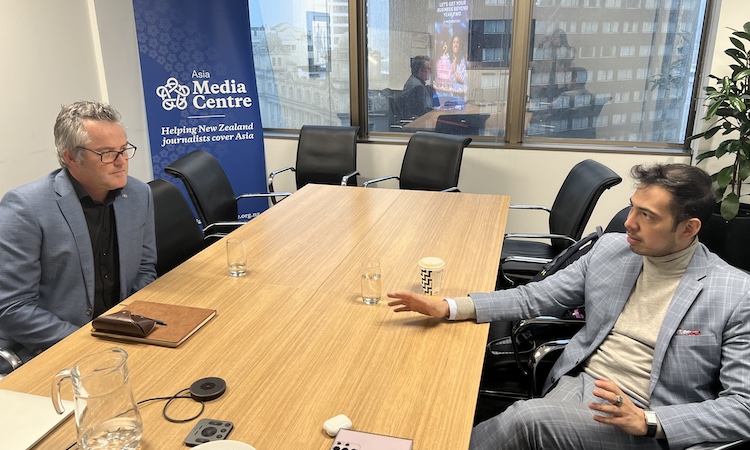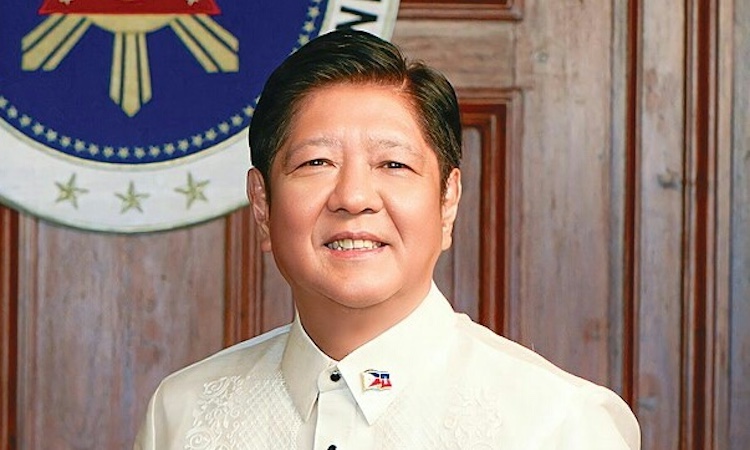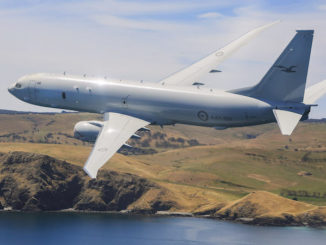
In this exclusive interview, chief editor Nicholas Dynon sits down with academic, columnist and author Richard Heydarian to explore what makes ASEAN a ‘donkey’ and why Philippines connects the South China Sea and Taiwan Strait.
As Chinese Premier Li Qiang was working through his official visit itinerary only blocks away in downtown Auckland, I met for the first time the widely lauded Philippines, ASEAN, and global affairs specialist Richard Heydarian.
Professorial Chairholder in Geopolitics at the Polytechnic University of the Philippines and author of, among others, The Indo-Pacific: Trump, China and the New Struggle for Global Mastery, Richard is a regular contributor to Centre for Strategic and International Studies (CSIS) and Council on Foreign Relations (CFR).
I had only an hour and a half to interview Richard at the invitation of the Asia New Zealand Foundation’s Asia Media Centre prior to his next speaking engagement at a roundtable hosted by the Centre at a trendy restaurant in Britomart. But what an hour and a half it was!
Just the day before he had been a panel speaker at the Victoria University of Wellington Centre for Strategic Studies’ one-day symposium ‘New Zealand’s Maritime Security: Emerging challenges and opportunities’. It seemed a natural place from which to launch into the interview. What follows is part-one of an abridged version.
Read this article in the digital edition…
ND: What did you speak on at the maritime security symposium?
RH: My talk was on ‘the 50 Shades of hedging’, which is how I refer to Southeast Asian countries coping with the US-China rivalry. None of us want to make a definitive choice between the two sides, even the Philippines, which is a US treaty ally.
But it’s a wide spectrum. There is a Malaysian way of doing it. In fact, there’s a Anwar Ibrahim Malaysian way of doing it, then a Mahathir of 2018 versus Mahathir of 2019 way of doing it. In the Philippines, there’s an early Duterte way of doing it, and there’s a late Duterte way of doing it… and there’s a Marcos Jr way of doing it.
What we see are not only a variety of strategies that individual Southeast Asian countries are employing to not only survive but thrive in this era of great power competition, but also internal fault lines, internal debates. Some Southeast Asian countries are obviously not as democratic as others, but the reality is that even in the more authoritarian systems there are lively debates behind the scenes, and sometimes that seeps into the open.
I think the most dramatic of these is the case of Vietnam, where what we’re now seeing feels like a kind of Sovietology – how it would have felt watching the Soviet Union from Khrushchev to Brezhnev and its final years – whereby there’s no democracy, there’s no contestation outside the party, but all the drama is inside.
And I think the drama has not yet settled considering the number of presidents they’ve been firing over the past few years, and the complete reshuffle of their politburo.
I say this as someone who has been dealing with Vietnam since 2013, when we filed the arbitration case against China on the South China Sea. Us Filipinos have always found the Vietnamese our natural ally in the region because no other country in the region has been as pesky and plucky in dealing with the Chinese.

Nicholas Dynon in conversation with Richard Heydarian at the Asia Media Centre.
The level of domestic upheaval we’re seeing is quite astonishing, and it is influencing the extent to which Vietnam will be willing to engage in the kind of pushback [against China] that has been expected of it [previously]. I think the concern of the emerging regime in Vietnam is more around colour revolutions and economic stability, and therefore they have more than enough incentive to keep things on an even keel with China.
Having said that, I did support and commend the visit by President Marcos Jr. to Vietnam earlier this year. And that was about mini-lateral cooperation.
The context of my symposium speech was that ASEAN is broken. We’re at the ontological level of debates right now – Is ASEAN a cow? Or is it a horse? As crazy as it sounds, the cow versus horse idea of [former Singaporean Ambassador-at-Large] Kausikan Bilahari is that ASEAN is not the kind of a beast that can be trained and then efficiently get things across the line. It’s more like a cow that does what it wants and once in a while listens to you. So, in short, don’t expect too much.
I think though that ‘donkey’ would be best for describing ASEAN in the sense that a donkey is not as fast and agile and powerful as a horse, but it does get things done. My hope for ASEAN is to be a donkey. But I don’t think we can be a donkey unless we complement deficits in our multilateralism, which is inherently broken due to being unanimity-based on anything security.
So, when one country says ‘no’, nothing happens. It’s no surprise then that in relation to Myanmar [ASEAN] is completely useless. In relation to the South China Sea it is completely useless. It’s just takes one country for nothing to happen. In this situation, mini-lateralism is the only way forward. So what I’m watching very carefully right now are the conversations between Anwar and Marcos and Vietnam.
The dark horse here is Indonesia, because we really don’t know where [President-elect] Prabowo will go. My contention is that Prabowo could turn out like a Marcus Jr, meaning not the best name, quite notorious, not a history that inspires a lot of confidence, a lot of schmoozing with China. And yet, someone who is a product of Western education and speaks English. He understands things, and I think has a big enough ego to understand that Indonesia should not be just a factotum to a country like China.
Indonesia is big enough itself to exercise influence as the de facto big brother in the region and G20 power. It is important to get Indonesia on board, because while Indonesia is not a direct claimant to the South China Sea disputes, it does have maritime disputes with China in the North Natuna Sea. China is just so vague, and so greedy, and so ambiguously aggressive about its strategy.
It’s just unlucky that Philippines suddenly went from Duterte passivity to the kind of proactiveness that you would expect from a country like the Philippines, while in the meantime, Indonesia and Malaysia have been relatively quiet because they’ve got what they wanted.
Malaysia did the drilling in 2020-21, which kept things on an even keel. The price they paid for that was to attack AUKUS, and they kind of got away with that too. The Indonesians have some understanding of North Natuna, and they just finished Bandung-Jakarta railway project, so they got that done.
But then again, this is a boxing match, and we’re just at Round Four or Five. So if anyone thinks this is the final story, it is not. We’re still in the middle rounds here, which could be crucial and could determine the trajectory of the region and of US-China competition
The US has a treaty alliance with the Philippines, so great power competition is directly attached to the South China Sea disputes.

Ferdinand “Bongbong” Romualdez Marcos Jr., Philippines President.
ND: There’s been something of a rush by those countries in the region with a treaty or agreement with the US to look at the fine print of these, concerned about what they exactly mean if push was to come to shove? If push were to come to shove with China, will the US be standing by the Philippines?
RH: Look at what the US has been doing in Ukraine, even though Ukraine is not a NATO member and a much more problematic political economy, to put it mildly. Kudos to Zelenskyy for really mobilising things.
As people may know, Zelenskyy dropped by Manila, because the Philippines is the only Southeast Asian country that has, based on the principle of neutrality, actually voted in favour of Ukraine consistently in the United Nations. There are very few counties in Asia that have voted based on principle.
The Shangri-La Dialogue was even more important for what happened during the question and answer portion. If you look at President Marcos Jr’s keynote speech it was a very balanced speech with Marcos Jr effectively saying, “I’m here still extending the olive branch. I’m not choosing between US and China, we still need them.”
But during the question and answer portion the response of the President was very clear: “If a Filipino gets killed, I don’t care what you use; you use water cannons, actual cannons, laser, then we’re having a different conversation here.”
From Kissinger to Obama, America’s policy was strategic ambiguity, which is more ambiguous than strategic because obviously it didn’t work.
I understand why Kissinger did it. In the 70s, the Philippines was a little Bogeyman. We had the most advanced armed forces, we had all the state of the art weapons systems. We had the F35s and Abram tanks of that era. The Americans were worried that we might bully the rest, and then should China or Vietnam respond aggressively, dragging in Big Brother, it would be an unnecessary disruption from their Cold War priority of triangulating against the Soviet Union.
That’s why the US said they were not going to allow the Philippines to weaponise the mutual defence treaty for self-aggrandisement. Our “territorial self-aggrandisement” is literally what Kissinger put in his cable as a basis for Nixon administration policy. And then, by the 1990s, when the Americans left because they didn’t see the reason for spending so much on Clark [Air Base] and Subic [Naval Base], they just abandoned us on Mischief Reef and during the Scarborough Shoal in 2012. Complete ambiguity. No strategy.
And that’s why Richard Fontaine [CEO of the Centre for a New American Century] calls it the “lost decade”. This was the 2010s when the South China Sea was not as dominated by China as it is today. It was really in 2019 when Pompeo came to Manila on the side-lines of Trump’s Hanoi, North Korea circus that he clarified that any attack on Philippine public vessels, or aircraft, or soldiers, or warships, will activate mutual defence treaty in the South China Sea.
At least the Trump administration narrowed the ambiguity significantly, which was also picked up by Biden administration – so it has been a bipartisan. The problem though is that the Chinese are very adept at grey zone strategy, so what we’re doing now is moving from a modality-based understanding of the parameters of the mutual defence treaty to an outcome-oriented one. In other words, “I don’t care what weapon systems or non-weapon systems you use, if you kill a Filipino, if someone gets injured, or something lethal happens, then the mutual defence treaty can be activated.”
It’s not a debate whether the Americans would come to our assistance or not. Whether you’re talking to top Republicans who could be serving in Trump 2.0, or you’re talking to Biden’s people, everyone understands that China is the real deal as far as threat to America is concerned.
So if you’re willing to give tens of billions of dollars to an ally in the Middle East, give tens of billions of dollars to a non-NATO partner in Eastern Europe, there’s just no way you cannot do anything about the Philippines – precisely because the Philippines is part of a second Theatre, which is Taiwan. There’s no way that you can separate the Philippines from the Taiwan issue.
My contention is that the reason why China is so aggressive to the Philippines – you might say excessively and recklessly aggressive – is because they’re worried about what we’re going to do on the Taiwan question.
ND: So, is this ultimately, given China’s interests, a South China Sea issue or an East China Sea issue?
RH: We’re seeing that the some of the vessels that China has been using in the Taiwan Strait are now also operating in the South China Sea. So now it’s an integrated theatre operationally and strategically, and we’re responding accordingly.
And the big game right now is missile defence systems, because the Chinese have complete dominance when it comes to missile defence. The lasagne layers of anti-cruise missile systems they have is their advantage here. To match that properly, it could be the sovereign prerogative of Japan and the Philippines to host American missile defence systems. The US has enough of these in Guam and in some of the bases in Japan in the scenario that China pushes things all the way to the Western Pacific. But if we’re looking narrowly at the Taiwan Strait, it’s far from enough.
So the worry of the Chinese – and they’re planning over this – is that the Philippines will give the Americans maximum access to sovereign bases just 100 nautical miles away from the Taiwan Strait. That’s extremely close.
ND: How likely is that to happen? In your view?
RH: That’s where we have leverage. My contention is that war is very unlikely for the foreseeable future for a million reasons. The Taiwan issue is a game of deterrence. And the deterrence game will be dependent on how much everyone chips in. Maybe the Japanese are way ahead of us, the Australians are being dragged into this in one way or another. You in New Zealand are having your debates whether you’re going to be dragged in via Australia or AUKUS, etc.
For the Philippines, the way I see it is that we don’t need to go 10 out of 10, we can go three or four out of 10, and we’ll still have sufficient preparedness and loyalty to our alliances.
So what the Philippines should do is make it clear to the Chinese, “if you continue to do what you’re doing in the South China Sea, if you’re going to force us out of the Second Thomas Shoal using extremely violent means, we’re going to give the Americans everything they want and you’re going to regret that for the rest of your lives. And what, you’re going to bomb us? You’re not going to do that, so be careful!”
The Chinese are thinking that if they bully us in the South China Sea we’ll get scared and roll back. What they don’t know is that actually the leverage is now with the Philippines, because it’s not China’s business what we do with our bases.
Now there are folks who will disagree with me and say “no, no, the situation is far more alarming than you suppose,” and that the worst case scenario is not us losing the South China Sea but the PRC becoming our immediate neighbour to the north by occupying Taiwan. But my point is that argument is a little bit premature.
I don’t think we’re at that phase yet. I think we’re still in the phase of leveraging and hedging. The Philippines is still in an hedging situation.
Part-Two of this interview will be published in the Spring 2024 issue of Line of Defence Magazine and online. We are grateful to the Asia New Zealand Foundation’s Asia Media Centre for arranging the interview.






